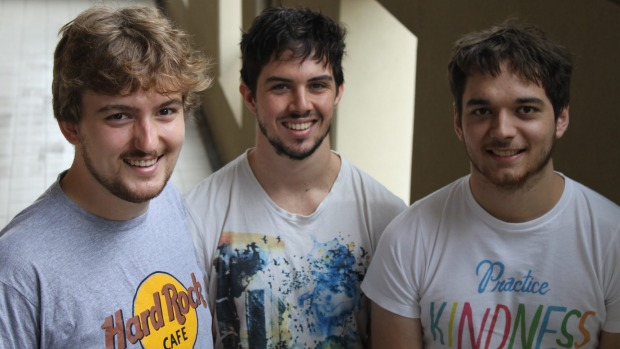
A 23-year-old University of Queensland engineering student has been rewarded for his creation of a medical device he hopes will improve the lives of children suffering from respiratory problems, winning the Young Innovator of the Year award at information technology’s night of nights in Melbourne.
Much like TV’s Logies, the peak Australian technology industry bodies hold an awards night each year, called the iAwards.
I thought I could sit there and write Flappy Bird 2 or I could devote myself to something like this and I [ thought] this was the best use of my skills and the resources I have at hand.
Entrepreneur Elliot Smith
This year some of the most interesting entries were those from young Australians, and the medical device put forward by University of Queensland student Elliott Smith was no exception. It won two accolades, the Hills Young Innovator of the Year award, which netted him $10,000, and $5000 for best mobile application.

Called Pepster, Smith’s app and prototype device – created with two other university students as part of a thesis project – aims to help children manage the life-threatening disorder cystic fibrosis, a genetic disease that affects approximately 1 in every 2500 Australians. The disease causes thick, sticky mucus to build up in the lungs and digestive tract.
Pulling together a face mask linked to a miniature computer and a Nexus 7 Google tablet, Pepster makes breathing therapy fun and less of a chore by using the patient’s breath as a game controller. There are two video games, one similar to the popular Flappy Bird and another where the breath controls a spaceship.

The games mimic medical devices in the way patients conduct the breathing excercises.
Pepster also records how well a patient is doing for physicians to monitor. Similar medical devices don’t record information, making it difficult to determine if therapy adjustments are needed.
Smith said Pepster is essentially a digital version of medical devices but connected to a mobile or a tablet. It’s aimed at children form 4 to 14 years of age.
“This incentivises them to do their physiotherapy more regularly and also allows us to record the information and send it back to the doctors,” he said.
A clinical trial involving 30 patients at Mater Children’s Hospital in Brisbane is now underway. Once completed, Smith and his team will finish prototyping the Pepster device, then seek approval from Australia’s Therapeutic Goods Association and the United States Food and Drug Administration to bring it to market.
Although he couldn’t comment on the medical trial, Smith said things were looking positive as many patients were using the device regularly.
“From the parents, the feedback is that their children are genuinely enjoying the experience and it’s stopped being almost a chore.”
Having the ability to record data would be crucial to doctors’ understanding of the disease and therapy progression, he added.
Smith said his device was targeted at children due to the unfortunate low life expectancy of people with cystic fibrosis.
A spokesman at the Mater Children’s Hospital said Pepster could potentially improve lives.
“If it works it would definitely improve the quality of life of patients, improve the lung function in the short-term and if these could be sustained then it would improve life expectancy,” the spokesman said.
There had been some issues with the Pepster devices breaking during the trial, but when they did work patients liked them.
“Patients like the device and there is a great amount of good will to help the investigators improve the device.”
He said there were high hopes for Pepster as patients typically ranked chest physiotherapy, a key cystic fibrosis treatment, as their least preferred treatment and one they were least likely to perform.
“Improving the frequency and efficacy of physiotherapy could therefore be very helpful,” he added.
Smith said he began work on the device with Jeremy Herbert and Gavin Kremor towards the end of his electrical engineering degree.
“I thought I could sit there and write Flappy Bird 2 or I could devote myself to something like this and I [thought] this was the best use of my skills and the resources I have at hand, and it’s a really rewarding thing to spend your time on I guess.”
Tom Sykes, general manager of product development at Hills and a judge of the award, said of the many applications received Pepster “really stood out as a clever medical innovation with strong commercial prospects”.
“We’re delighted that this financial support will take Pepster closer to commercialisation and improve quality of life for people living with respiratory conditions like cystic fibrosis,” he said.
Source: Brisbane Times
